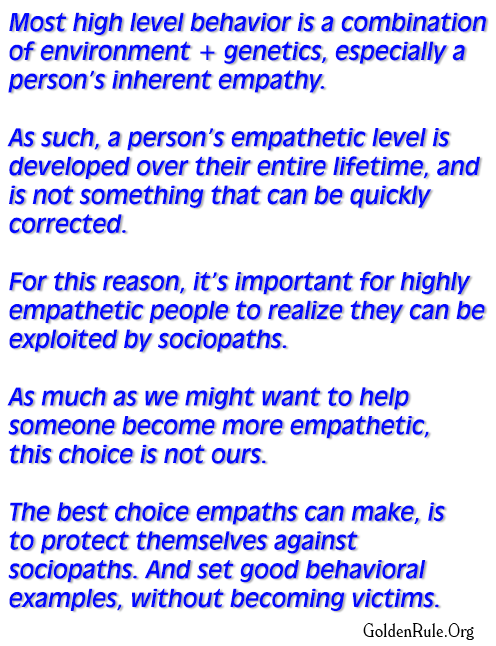The first two parts of the Golden Path involve recognizing the value of empathy, and being able to identify and measure it.
The Third part of the Golden Path involves how to Act on this knowledge and understanding to make your life more rewarding and meaningful.
The goal is to maximize the amount of empathy you espouse, as well as the amount of empathetic people in your circle. Then expand your circle ever outward promoting these values.
Where Does Empathy Come From?
There are varying schools of thought on the nature of empathy, and how it develops. Understanding this nature helps us figure out ways of manipulating our ability to be empathetic.
Some believe empathy is tied to genetics. Some are born more inherently empathetic, while others may be born more sociopathic. Some scientific research points to chemicals in the brain that are affected by heredity and genetics. But there’s also science to suggest environment plays a very significant factor. Your lifestyle also affects the chemical makeup of your brain.
Our brain is basically a beautifully designed biological computer that runs on electricity and chemicals. There is a “base configuration” of the brain based on genetics, but once we’re born, our brain-computer begins being programmed by the stimuli (experiences) we are subjected to.
 As we grow, we train our brain to respond to different inputs. We learn things; we begin to develop perception and awareness. We make choices and develop judgement. We organize a value system that is based on choices we make, coupled with benefits and detriments we experience. One way we reinforce our value system is through our experiences, which stimulate the pleasure/pain centers of our brain. As we develop, we fine tune what works for us as being pleasurable, and what doesn’t as being painful.
As we grow, we train our brain to respond to different inputs. We learn things; we begin to develop perception and awareness. We make choices and develop judgement. We organize a value system that is based on choices we make, coupled with benefits and detriments we experience. One way we reinforce our value system is through our experiences, which stimulate the pleasure/pain centers of our brain. As we develop, we fine tune what works for us as being pleasurable, and what doesn’t as being painful.
On the most shallow level, we are programmed with basic value systems that tell us, for example, that a back rub is pleasurable, but a punch in the stomach is not. Each of these activities is reinforced in the brain through the nervous system and chemical endorphins:
Endorphins are neurotransmitters, chemicals that pass along signals from one neuron to the next. Neurotransmitters play a key role in the function of the central nervous system and can either prompt or suppress the further signaling of nearby neurons.
Endorphins are produced as a response to certain stimuli, especially stress, fear or pain, but also pleasure and joy. They originate in various parts of your body — the pituitary gland, your spinal cord and throughout other parts of your brain and nervous system — and interact mainly with receptors in cells found in regions of the brain responsible for blocking pain and controlling emotion.
However, our brain, being seemingly infinitely complex, has the ability to manage much more than simple processes like pleasure and pain. The older we get, the more we develop high level behavior that involves very complex and intertwined arrays of stimuli and value judgements.
Why do some people like a certain vegetable but another person my not? If it’s not a health issue, it is likely the result of a very complex array of value judgements our brain has been programmed with, often without our awareness. Much high level behavior manifests this way over long periods of time and many millions of stimuli. Perhaps the reason why there’s a certain song that makes you feel a certain way, is because of an array of past memories that reinforce something positive or negative? Sometimes this is obvious; sometimes it’s not.
Empathy manifests in this way as well. A person’s ability to think of others is a habit that develops in the brain. It is a trait that is reinforced in various ways over a person’s entire lifetime. A person isn’t necessarily born a sociopath, but perhaps they have sociopathic tendencies. Whether they develop into a full-blown sociopath or psychopath has a lot to do with whether or not their upbringing involved positive or negative reinforcement of anti-social behavior.
For example, there are notable differences between inherent empathy among people of different cultures. A person who grew up in a culture that didn’t positively reward altruism and personal sacrifice in the service to others or the greater good, they’re unlikely to be highly empathetic. There are certain cultures around the world today where the people are known for being incredibly insensitive. The culture they came from plays a part in this, emphasizing personal accomplishment over collective success. Likewise, there are cultures where, for example, the concept of stealing from another is almost unheard of, because such cultures value and promote empathy personally and socially.
Empathy is A Trait That Can Be Honed Like Any Other Skill Or Knowledge
Our brains, in addition to being chemical computers, are also muscles. The more we work them, the more efficient they become, the greater capacity they have to process information and control things. We can “train” our brain like we train other muscles, using various exercises. As such, we can focus on certain characteristics we want to enhance, and overcome negative traits we want to curtail.
You could easily spend all day online researching, “brain games” puzzles and exercises designed to increase your memory, I.Q., spatial awareness, etc. Likewise, we can suggest perform exercises and activities to help increase your empathy.

